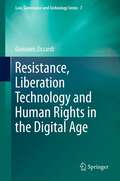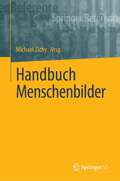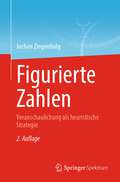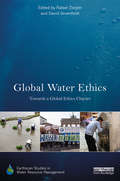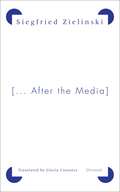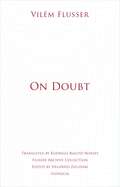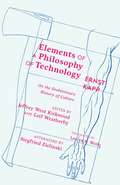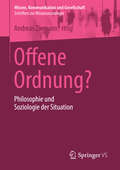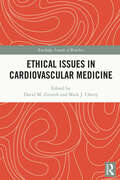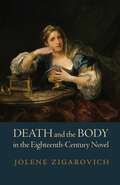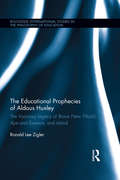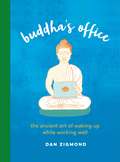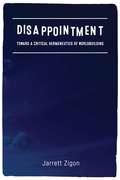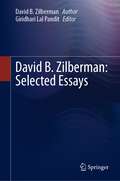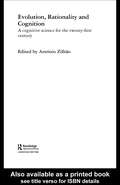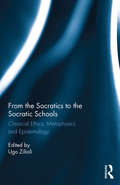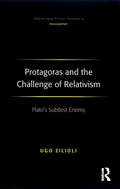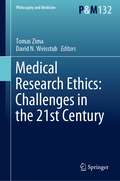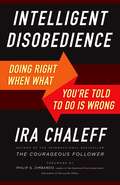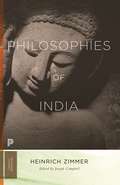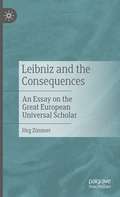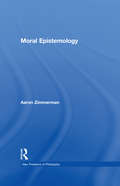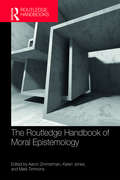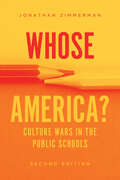- Table View
- List View
Resistance, Liberation Technology and Human Rights in the Digital Age
by Giovanni ZiccardiThis book explains strategies, techniques, legal issues and the relationships between digital resistance activities, information warfare actions, liberation technology and human rights. It studies the concept of authority in the digital era and focuses in particular on the actions of so-called digital dissidents. Moving from the difference between hacking and computer crimes, the book explains concepts of hacktivism, the information war between states, a new form of politics (such as open data movements, radical transparency, crowd sourcing and "Twitter Revolutions"), and the hacking of political systems and of state technologies. The book focuses on the protection of human rights in countries with oppressive regimes.
Handbuch Menschenbilder
by Michael ZichyMenschenbilder sind Ausdruck menschlicher Selbstverständnisse und wichtige Größen. Denn sie beeinflussen unsere Wahrnehmung, sie prägen unser Denken, Fühlen und Handeln, sie liegen unseren sozialen Ordnungen – der Moral, der Pädagogik, dem Recht, dem politischen System usw. – zugrunde, und sie sind konstitutiv für die Art und Weise, wie wir Menschen sind. Identifikation, Beschreibung, Analyse und insbesondere Kritik von Menschenbildern sind daher ein wissenschaftliches und gesellschaftliches Desiderat.Vor diesem Hintergrund verfolgt dieses erste Handbuch zum Thema Menschenbild zwei Ziele: Es will die Menschenbildforschung in ihr Recht setzten und sie voranbringen. Es bietet einen umfassenden Einblick in die Vielgestaltigkeit, in Funktionen und Auswirkungen sowie in die Produktion von Menschenbildern in unterschiedlichen Bereichen von Wissenschaft und Gesellschaft. Es ist durch einen interdisziplinären Zugang charakterisiert, der eine Vielzahl human-, geistes-, kultur- und sozialwissenschaftlicher Perspektiven bündelt. Aktuelle, fundierte und von ausgewiesenen Fachleuten verfasste Beiträge geben einen Überblick über Themenfelder und Debatten der Menschenbildforschung und arbeiten ihre Aktualität heraus. Das Handbuch versammelt dabei nicht nur Beiträge, die den Stand der Forschung konzise zusammenfassen, sondern auch solche, die für ihre Bereiche erstmalig das Thema Menschenbild aufgreifen und untersuchen.
Energie aus Biomasse - ein ethisches Diskussionsmodell
by Michael Zichy Christian Dürnberger Beate Formowitz Anne UhlEnergie aus Biomasse wird auf politischer, wissenschaftlicher und gesellschaftlicher Ebene höchst kontrovers diskutiert. – Dieses Buch liefert eine fundierte, klare und gut verständliche Analyse und Diskussion der ethischen und kulturell-emotionalen Aspekte von Energie aus Biomasse. Es diskutiert die Frage der Verantwortung und bringt naturwissenschaftliche und ethische Expertise in einen fruchtbaren Dialog. Vergleichende Fallstudien und Szenarien sorgen für die praktische Anbindung an die derzeitige landwirtschaftliche Praxis. Die zweite, überarbeitete Auflage bezieht sich auf die aktuellen gesetzlichen Rahmenbedingungen und berücksichtig die neuesten wissenschaftlichen Beiträge zum Diskurs, wie zum Beispiel zu indirekten Landnutzungsänderungen.
Figurierte Zahlen: Veranschaulichung als heuristische Strategie
by Jochen ZiegenbalgDieses Buch behandelt die Visualisierung als Methode des mathematischen Problemlösens, Begründens und Beweisens: Konkrete Beispiele zur Veranschaulichung durch mathematische Figuren und Bilder bieten einen faszinierenden Einblick in das Argumentieren anhand strukturierter und strukturierender Figuren zur Betrachtung von Zahlen und Zahlenfolgen. Die historischen Wurzeln dieses mathematischen Handwerkszeugs werden dabei so weit wie möglich einbezogen. Die Beispiele sind in der Regel konstruktiver Natur; gelegentlich wird, wo angebracht, die algorithmische Erschließung durch Hinweise auf die Programmierung mit Hilfe von Computeralgebra Systemen ergänzt. Das Buch richtet sich an Studierende und Lehrende an Schulen und Hochschulen, sowie an alle an der Elementarmathematik interessierten Nichtspezialisten, die das mathematische Arbeiten einmal außerhalb der von den Bildungsinstitutionen vorgezeichneten Pfade kennenlernen wollen. Es liefert insbesondere Lehrkräften und Lehramtsstudierenden wertvolle Anregungen, etwa zur Förderung mathematisch interessierter Schülerinnen und Schüler. In der 2. Auflage ist mit den mathematisch fundamentalen und historisch bedeutsamen Themen Wechselwegnahme, Teilbarkeit, Euklidischer Algorithmus, Inkommensurabilität und Kettenbrüche ein neues, für Visualisierungen gut geeignetes Kapitel hinzugekommen. Bereits bestehende Kapitel wurde durch Abschnitte über Trapezzahlen, ungerade Quadratzahlen und zentrierte Polygonalzahlen ergänzt.
Global Water Ethics: Towards a global ethics charter (Earthscan Studies in Water Resource Management)
by Rafael Ziegler David GroenfeldtScholarly interest in water ethics is increasing, motivated by the urgency of climate change, water scarcity, privatization and conflicts over water resources. Water ethics can provide both conceptual perspectives and practical methodologies for identifying outcomes which are environmentally sustainable and socially just. This book assesses the implications of ongoing research in framing a new discipline of water ethics in practice. Contributions consider the difficult ethical and epistemological questions of water ethics in a global context, as well as offering local, empirical perspectives. Case study chapters focus on a range of countries including Canada, China, Germany, India, South Africa and the USA. The respective insights are brought together in the final section concerning the practical project of a universal water ethics charter, alongside theoretical questions about the legitimacy of a global water ethics. Overall the book provides a stimulating examination of water ethics in theory and practice, relevant to academics and professionals in the fields of water resource management and governance, environmental ethics, geography, law and political science.
[...After the Media]: News from the Slow-Fading Twentieth Century
by Siegfried Zielinski Gloria CustanceThe media are now redundant. In an overview of developments spanning the past seventy years, Siegfried Zielinski's [ . . . After the Media] discusses how the means of technology-based communication assumed a systemic character and how theory, art, and criticism were operative in this process. Media-explicit thinking is contrasted with media-implicit thought. Points of contact with an arts perspective include a reinterpretation of the artist Nam June Paik and an introduction to the work of Jake and Dinos Chapman. The essay ends with two appeals. In an outline of a precise philology of exact things, Zielinski suggests possibilities of how things could proceed after the media. With a vade mecum against psychopathia medialis in the form of a manifesto, the book advocates for a distinction to be made between online existence and offline being.
On Doubt
by Siegfried Zielinski Vilém Flusser Rodrigo Maltez NovaesIn On Doubt, Vilém Flusser refines Martin Heidegger's famous declaration that "language is the dwelling of Being." For Flusser, "the word is the dwelling of being," because in fact, in the beginning, there was the word. On Doubt is a treatise on the human intellect, its relation to language, and the reality-forming discourses that subsequently emerge. For Flusser, the faith that the modern age places in Cartesian doubt plays a role similar to the one that faith in God played in previous eras--a faith that needs to be challenged. Descartes doubts the world through his proposition cogito ergo sum, but leaves doubt itself untouched as indubitable and imperious. His cogito ergo sum may have proved to the Western intellect that thoughts exist, but it did not prove the existence of that which thinks: one can eliminate thinking and yet continue being.Therefore, should we not doubt doubt itself? Should we not try to go beyond this last step of Cartesian doubt and look for a new faith? The twentieth century has seen many attempts to defeat Cartesian doubt, however, this doubt of doubt has instead generated a complete loss of faith, which the West experiences as existential nihilism. Hence, the emergent emptying of values that results from such extreme doubt. Everything loses its meaning. Can this climate be overcome? Will the West survive the modern age?
Elements of a Philosophy of Technology: On the Evolutionary History of Culture (Posthumanities #99)
by Siegfried Zielinski Leif Weatherby Ernst Kapp Jeffrey West KirkwoodThe first philosophy of technology, constructing humans as technological and technology as an underpinning of all culture Ernst Kapp was a foundational scholar in the fields of media theory and philosophy of technology. His 1877 Elements of a Philosophy of Technology is a visionary study of the human body and its relationship with the world that surrounds it. At the book’s core is the concept of “organ projection”: the notion that humans use technology in an effort to project their organs to the outside, to be understood as “the soul apparently stepping out of the body in the form of a sending-out of mental qualities” into the world of artifacts.Kapp applies this theory of organ projection to various areas of the material world—the axe externalizes the arm, the lens the eye, the telegraphic system the neural network. From the first tools to acoustic instruments, from architecture to the steam engine and the mechanic routes of the railway, Kapp’s analysis shifts from “simple” tools to more complex network technologies to examine the projection of relations. What emerges from Kapp’s prophetic work is nothing less than the emergence of early elements of a cybernetic paradigm.
Offene Ordnung?
by Andreas ZiemannWelterfahrung, Vergesellschaftung und die Organisation der Alltagspraxis sind grundlegend situiert und situativ. In Situationen erleben und handeln wir - mit Anderen, für Andere, gegen Andere. Als Kategorie ist die Situation jedoch ins Vergessen geraten und theoretisch wie empirisch scheinbar irrelevant geworden. Dabei - so eine zentrale These des Sammelbandes - kann gerade die ,Situation' zwischen der Handlungs- und Strukturtheorie, zwischen dem Mikro- und Makrobereich des Sozialen vermitteln. Aus philosophischer und soziologischer Perspektive wird hier an einer Re-Vitalisierung der Situationstheorie und -analyse gearbeitet. Eine zentrale Frage lautet: Wie wird soziale Ordnung in actu und in situ verhandelt, dargestellt und legitimiert? Dabei geht es auch um die programmatische Anfrage respektive das Erklären des Auftauchens und Eindringens von Unerwartetem, Unwahrscheinlichem, Komischem oder Neuem in Situationen. Mit Beiträgen von: Gregor Bongaerts, Jens Bonnemann, Anna Echterhölter, Lorenz Engell, Joachim Fischer, Wil Martens, Stefan Meißner, Karl Mertens, Jo Reichertz, Hans-Georg Soeffner, Christiane Voss und Andreas Ziemann.
Ethical Issues in Cardiovascular Medicine (Routledge Annals of Bioethics)
by David M. Zientek Mark J. CherryThis book provides an exploration of the ethics of cardiology practice. It provides a variety of frameworks for analyzing ethical issues that arise in cardiovascular medicine. Cardiovascular medicine—the diagnosis and treatment of congenital and acquired diseases of the heart, major arteries, and veins—has seen rapid change in diagnosis, treatment, and the organization of practice in the last half of the twentieth and the beginning of the twenty first century. The complexity of these developments has resulted in increasing subspecialization, and many practitioners are challenged to stay abreast with the latest developments in cardiology. These changes also bring with them various ethical challenges. The chapters in this volume are divided by five broad areas of practice: beginning-of-life, end-of-life, transplantation and allocation of expensive or scarce resources, professionalism, and research. The case-based approach presented across the volume provides a perspective that will allow readers to reason through current and future ethical issues as they arise in this rapidly changing field. Ethical Issues in Cardiovascular Medicine will be of interest to researchers working in bioethics, clinical ethics, and the philosophy of medicine, as well as practicing physicians, nurses, and students who work in cardiovascular medicine.
Death and the Body in the Eighteenth-Century Novel
by Jolene ZigarovichDeath and the Body in the Eighteenth-Century Novel demonstrates that archives continually speak to the period’s rising funeral and mourning culture, as well as the increasing commodification of death and mourning typically associated with nineteenth-century practices. Drawing on a variety of historical discourses—such as wills, undertaking histories, medical treatises and textbooks, anatomical studies, philosophical treatises, and religious tracts and sermons—the book contributes to a fuller understanding of the history of death in the Enlightenment and its narrative transformation.Death and the Body in the Eighteenth-Century Novel not only offers new insights about the effect of a growing secularization and commodification of death on the culture and its productions, but also fills critical gaps in the history of death, using narrative as a distinct literary marker. As anatomists dissected, undertakers preserved, jewelers encased, and artists figured the corpse, so too the novelist portrayed bodily artifacts. Why are these morbid forms of materiality entombed in the novel? Jolene Zigarovich addresses this complex question by claiming that the body itself—its parts, or its preserved representation—functioned as secular memento, suggesting that preserved remains became symbols of individuality and subjectivity. To support the conception that in this period notions of self and knowing center upon theories of the tactile and material, the chapters are organized around sensory conceptions and bodily materials such as touch, preserved flesh, bowel, heart, wax, hair, and bone. Including numerous visual examples, the book also argues that the relic represents the slippage between corpse and treasure, sentimentality and materialism, and corporeal fetish and aesthetic accessory.Zigarovich’s analysis compels us to reassess the eighteenth-century response to and representation of the dead and dead-like body, and its material purpose and use in fiction. In a broader framework, Death and the Body in the Eighteenth-Century Novel also narrates a history of the novel that speaks to the cultural formation of modern individualism.
The Educational Prophecies of Aldous Huxley: The Visionary Legacy of Brave New World, Ape and Essence and Island (Routledge International Studies in the Philosophy of Education)
by Ronald ZiglerThe visionary legacy of Aldous Huxley is as relevant today as ever. Huxley possessed a sober understanding of the human condition as well as an inspired vision of the human potential. This volume presents an interdisciplinary examination and appreciation of Aldous Huxley’s three visionary novels – Brave New World (1932), Ape and Essence (1948), and Island (1962) – to reveal the extent to which Huxley’s prognoses into our possible futures was prophetic. The author assesses each novel to reveal the foresights that define our current educational, social, religious, political, and economic institutions, while also exposing our conflicts within those institutions. This volume examines the educational, cultural and technological changes that have shaped our society since Huxley’s work, with special reference to the enduring legacy of educational philosopher John Dewey. It offers profound insights into the educational forces and moral foundations of our society that shape us, both inside and outside of our schools. It is the first of its kind to focus exclusively on all three of Huxley’s visionary novels and detail their relevance to our world today.
Buddha's Office: The Ancient Art of Waking Up While Working Well
by Dan ZigmondCan enlightenment be found at the office? From the co-author of Buddha's Diet comes another book that shows how the wisdom of Buddha can apply to our modern lives -- this time exploring how Buddha's guidance can help us navigate the perils of work life. Without setting foot in an office, Buddha knew that helping people work right was essential to helping them find their path to awakening. Now more than ever, we need Buddha's guidance. Too many of us are working long hours, dealing with difficult bosses, high-maintenance coworkers, and non-stop stress. We need someone to help remind us that there is a better way. With Buddha's wisdom at the core of every chapter, Buddha's Office will help you learn how to stop taking shortcuts and pay more attention, care for yourself and others, deal with distractions, and incorporate Buddha's ageless instructions into our modern working life.It's time to wake up and start working in a more enlightened way. One that is right for you, right for our health, right for your sanity, and right for the world.
Disappointment: Toward a Critical Hermeneutics of Worldbuilding
by Jarrett ZigonIncreasingly, anthropologists, political theorists and philosophers are calling for imaginative and creative analyses and theories that might help us think and bring about an otherwise. Disappointment responds to this call by showing how collaboration between an anthropologist and a political movement of marginalized peoples can disclose new possibilities for being and acting politically. Drawing from nearly a decade of research with the global anti-drug war movement, Jarrett Zigon puts ethnography in dialogue with both political theory and continental philosophy to rethink some of the most fundamental ontological, political and ethical concepts. The result is to show that ontological starting points have real political implications, and thus, how an alternative ontological starting point can lead to new possibilities for building worlds more ethically attuned to their inhabitants.
David B. Zilberman: Selected Essays
by David B. ZilbermanThis book is a selection of articles by David Zilberman, a prolific author, whose tragic untimely death did not allow to finish many of his undertakings. Zilberman’s work represents a fresh word in the way of philosophizing or philosophy-building and the technique of modal methodology. This book comprises of thirteen independent articles that are not related by content. The point of thematic convergence of these articles is the way they reflect the new way of methodological thinking through the application and benefits of modalization or modal methodology that unfolds unbound possibilities of philosophic elaborations. By shifting constantly from one position to another, Zilberman disclosed the antinomicity of all types of thought. Such an approach led him to outline for the first time his major attempt to start creating not "systems" but "sums" of philosophies so that the philosophical activity would be able to re-emerge on the slopes of such "sums." The book can be used as a starting point of a discussion, especially in study of philosophy. We imagine it can be used in undergraduate classes on World Philosophies or Intercultural Philosophy courses. With that, it can serve as a useful resource for adding intercultural elements into Western-centered courses.
Evolution, Rationality and Cognition: A Cognitive Science for the Twenty-First Century (Routledge Studies in the Philosophy of Science)
by António ZilhãoEvolutionary thinking has expanded in the last decades, spreading from its traditional stronghold – the explanation of speciation and adaptation in biology - to new domains. Fascinating pieces of work, the essays in this collection attest to the illuminating power of evolutionary thinking when applied to the understanding of the human mind. The contributors to Cognition, Evolution and Rationality use an evolutionary standpoint to approach the nature of the human mind, including both cognitive and behavioural functions. Cognitive science is by its nature an interdisciplinary subject and the essays in this collection investigate the workings of the mind through a variety of disciplines including the philosophy of science, the philosophy of mind, game theory, robotics and computational neuroanatomy. Topics covered range from general methodological issues to long-standing philosophical problems such as how rational human beings actually are. With contributions from leading experts in the areas involved, this book will be of interest across a number of fields, including philosophy, evolutionary theory and cognitive science.
From the Socratics to the Socratic Schools: Classical Ethics, Metaphysics and Epistemology
by Ugo ZilioliIn the two golden centuries that followed the death of Socrates, ancient philosophy underwent a tremendous transformation that culminated in the philosophical systematizations of Plato, Aristotle and the Hellenistic schools. Fundamental figures other than Plato were active after the death of Socrates; his immediate pupils, the Socratics, took over his legacy and developed it in a variety of ways. This rich philosophical territory has however been left largely underexplored in the scholarship. This collection of eleven previously unpublished essays by leading scholars fills a gap in the literature, providing new insight into the ethics, metaphysics, and epistemology as developed by key figures of the Socratic schools. Analyzing the important contributions that the Socratics and their heirs have offered ancient philosophical thought, as well as the impact these contributions had on philosophy as a discipline, this book will appeal to researchers and scholars of Classical Studies, as well as Philosophy and Ancient History.
Protagoras and the Challenge of Relativism: Plato's Subtlest Enemy (Ashgate New Critical Thinking in Philosophy)
by Ugo ZilioliProtagoras was an important Greek thinker of the fifth century BC, the most famous of the so called Sophists, though most of what we know of him and his thought comes to us mainly through the dialogues of his strenuous opponent Plato. In this book, Ugo Zilioli offers a sustained and philosophically sophisticated examination of what is, in philosophical terms, the most interesting feature of Protagoras' thought for modern readers: his role as the first Western thinker to argue for relativism. Zilioli relates Protagoras' relativism with modern forms of relativism, in particular the 'robust relativism' of Joseph Margolis, gives an integrated account both of the perceptual relativism examined in Plato's Theaetetus and the ethical or social relativism presented in the first part of Plato's Protagoras and offers an integrated and positive analysis of Protagoras' thought, rather than focusing on ancient criticisms and responses to his thought. This is a deeply scholarly work which brings much argument to bear to the claim that Protagoras was and remains Plato's subtlest philosophical enemy.
Medical Research Ethics: Challenges in the 21st Century (Philosophy and Medicine #132)
by Tomas Zima David N. WeisstubThis book provides a current review of Medical Research Ethics on a global basis. The book contains chapters that are historically and philosophically reflective and aimed to promote a discussion about controversial and foundational aspects in the field. An elaborate group of chapters concentrates on key areas of medical research where there are core ethical issues that arise both in theory and practice: genetics, neuroscience, surgery, palliative care, diagnostics, risk and prediction, security, pandemic threats, finances, technology, and public policy.This book is suitable for use from the most basic introductory courses to the highest levels of expertise in multidisciplinary contexts. The insights and research by this group of top scholars in the field of bioethics is an indispensable read for medical students in bioethics seminars and courses as well as for philosophy of bioethics classes in departments of philosophy, nursing faculties, law schools where bioethics is linked to medical law, experts in comparative law and public health, international human rights, and is equally useful for policy planning in pharmaceutical companies.
Intelligent Disobedience
by Philip Zimbardo Ira ChaleffWhen It's Smart to Say NoNearly every week we read about a tragedy or scandal that could have been prevented if individuals had said no to ill-advised or illegitimate orders. In this timely book, Ira Chaleff explores when and how to disobey inappropriate orders, reduce unacceptable risk, and find better ways to achieve legitimate goals.The inspiration for the book, and its title, comes from the concept of intelligent disobedience used in guide dog training. Guide dogs must recognize and resist a command that would put their human and themselves at risk and identify safer options for achieving the goal. This is precisely what Chaleff helps humans do. Using both deeply disturbing and uplifting examples, as well as critical but largely forgotten research, he shows how to create a culture where, rather than "just following orders," people hold themselves accountable to do the right thing, always.
Philosophies of India (Princeton Classics #71)
by Heinrich Robert ZimmerA Princeton Classics edition of an essential work of twentieth-century scholarship on India Since its first publication, Philosophies of India has been considered a monumental exploration of the foundations of Indian philosophy. Based on the copious notes of Indologist, linguist, and art historian Heinrich Zimmer, and edited by Joseph Campbell, this book is organized into three sections. “The Highest Good” looks at Eastern and Western thought and their convergence; “The Philosophies of Time” discusses the philosophies of success, pleasure, and duty; and “The Philosophies of Eternity” presents the fundamental concepts of Buddhism, Brahmanism, Jainism, Sankhya and yoga, and Tantra. This work examines such areas as the Buddhist Tantras, Buddhist Genesis, the Tantric presentation of divinity, the preparation of disciples and the meaning of initiation, and the symbolism of the mandala-palace Tantric ritual and twilight language. It also delves into the Tantric teachings of the inner Zodiac and the fivefold ritual symbolism of passion. Appendices, a bibliography, and general and Sanskrit indexes are included.
Leibniz and the Consequences: An Essay on the Great European Universal Scholar
by Jörg ZimmerLeibniz was probably the last universal scholar in modern times who made original and innovative achievements in all the essential fields of knowledge of his time: as a reform-oriented lawyer, a multilateral thinking diplomat, as a mathematician of infinitesimal calculus, as the inventor of a calculating machine and in the mining of horizontal wind power, as an organizer of science and as one of the first historians who strived for source-critical methodical objectivity. However, this baroque diversity can only be understood from the center of a monadological philosophy, which wants to establish the unity of scientific worldview and metaphysical concept of the world. It is distorted in the classical reception because only Leibniz the Theodicy was known. The topicality of Leibniz today consists in re-exposing the original basic idea of unity in diversity and asking how it can be made fruitful for philosophical and political thought in the 21st century. This book is a translation of the original German 1st edition Leibniz und die Folgen by Jörg Zimmer, published by J.B. Metzler, imprint of Springer-Verlag GmbH, part of Springer Nature in 2018. The translation was done with the help of artificial intelligence (machine translation by the service DeepL.com). A subsequent human revision was done primarily in terms of content, so that the book will read stylistically differently from a conventional translation. Springer Nature works continuously to further the development of tools for the production of books and on the related technologies to support the authors.
Moral Epistemology (New Problems of Philosophy)
by Aaron ZimmermanHow do we know right from wrong? Do we even have moral knowledge? Moral epistemology studies these and related questions about our understanding of virtue and vice. It is one of philosophy’s perennial problems, reaching back to Plato, Aristotle, Aquinas, Locke, Hume and Kant, and has recently been the subject of intense debate as a result of findings in developmental and social psychology. In this outstanding introduction to the subject Aaron Zimmerman covers the following key topics: What is moral epistemology? What are its methods? Including a discussion of Socrates, Gettier and contemporary theories of knowledge skepticism about moral knowledge based on the anthropological record of deep and persistent moral disagreement, including contextualism moral nihilism, including debates concerning God and morality and the relation between moral knowledge and our motives and reasons to act morally epistemic moral scepticism, intuitionism and the possibility of inferring ‘ought’ from ‘is,’ discussing the views of Locke, Hume, Kant, Ross, Audi, Thomson, Harman, Sturgeon and many others how children acquire moral concepts and become more reliable judges criticisms of those who would reduce moral knowledge to value-neutral knowledge or attempt to replace moral belief with emotion. Throughout the book Zimmerman argues that our belief in moral knowledge can survive sceptical challenges. He also draws on a rich range of examples from Plato’s Meno and Dickens’ David Copperfield to Bernard Madoff and Saddam Hussein. Including chapter summaries and annotated further reading at the end of each chapter, Moral Epistemology is essential reading for all students of ethics, epistemology and moral psychology.
The Routledge Handbook of Moral Epistemology (Routledge Handbooks in Philosophy)
by Aaron Zimmerman Karen Jones Mark TimmonsThe Routledge Handbook of Moral Epistemology brings together philosophers, cognitive scientists, developmental and evolutionary psychologists, animal ethologists, intellectual historians, and educators to provide the most comprehensive analysis of the prospects for moral knowledge ever assembled in print. The book’s thirty chapters feature leading experts describing the nature of moral thought, its evolution, childhood development, and neurological realization. Various forms of moral skepticism are addressed along with the historical development of ideals of moral knowledge and their role in law, education, legal policy, and other areas of social life. Highlights include: • Analyses of moral cognition and moral learning by leading cognitive scientists • Accounts of the normative practices of animals by expert animal ethologists • An overview of the evolution of cooperation by preeminent evolutionary psychologists • Sophisticated treatments of moral skepticism, relativism, moral uncertainty, and know-how by renowned philosophers • Scholarly accounts of the development of Western moral thinking by eminent intellectual historians • Careful analyses of the role played by conceptions of moral knowledge in political liberation movements, religious institutions, criminal law, secondary education, and professional codes of ethics articulated by cutting-edge social and moral philosophers.
Whose America?: Culture Wars in the Public Schools
by Jonathan ZimmermanIn this expanded edition of his 2002 book, Zimmerman surveys how battles over public education have become conflicts at the heart of American national identity. Critical Race Theory. The 1619 Project. Mask mandates. As the headlines remind us, American public education is still wracked by culture wars. But these conflicts have shifted sharply over the past two decades, marking larger changes in the ways that Americans imagine themselves. In his 2002 book, Whose America?, Zimmerman predicted that religious differences would continue to dominate the culture wars. Twenty years after that seminal work, Zimmerman has reconsidered: arguments over what American history is, what it means, and how it is taught have exploded with special force in recent years. In this substantially expanded new edition, Zimmerman meditates on the history of the culture wars in the classroom—and on what our inability to find common ground might mean for our future.
